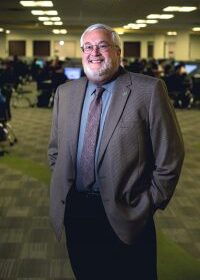Proof pits faith against facts
If a student claims sickness to miss class, his or her professor will often ask for proof in a doctor’s note. Not all students go to the doctor when sick, so if that student can’t produce the proof, it doesn’t mean he or she is lying.
USF’s School of Theatre and Dance explores this concept of hard evidence versus a person’s word in David Auburn’s Tony Award and Pulitzer Prize-winning play “Proof,” which opens tonight at 8 in Theater 2.
The story revolves around four characters: Robert, a recently deceased mathematical genius, his daughter, Catherine, Hal, a former student of Robert’s and Claire, Catherine’s sister. Upon Robert’s death, a mathematical proof concerning prime numbers is discovered in his office. When Catherine claims to have written the proof, questions of its true authorship arise.
“The word ‘proof’ gets used on many levels,” said Robert Maguire, a senior majoring in theater performance, who plays Hal. “There’s the actual mathematical sense, and in the sense of Catherine having to prove that this is her proof. What proof does Catherine have that this is her proof?”
Visiting director Lisa Powers Tricomi, who worked with USF’s School of Theatre and Dance last season on “The Waiting Room,” said the trouble for Catherine is whether or not she’s truthfully inherited her father’s mathematical ability, among other less desirable attributes.
“Catherine’s wondering if she’s inherited her father’s genius, or her father’s mental illness,” she said.
While Catherine struggles with her mental state, she attempts to convince, and eventually becomes close to, Hal. During rehearsal, Maguire said he found some aspects of his character harder to maintain than others.
“The hardest part is maintaining the optimism that Hal has in the face of some very low feelings from Catherine; some very weighting things that just pull Catherine down,” he said. “He’s known her for awhile, and he’s been able to see what she’s going through, and that’s tough.”
Tricomi said it’s never specifically revealed if Catherine is indeed crazy, or if she really is following in her father’s footsteps after learning from him. Instead, the cast leaves that interpretation open to the audience.
“Someone asked me if I’d decided if she was crazy or not,” Tracomi said. “And I don’t really think that that’s the question the play is asking.”
USF School of Theatre and Dance Director Marc Powers takes on the role of Robert in this production, in what he says is his first role “in several years.”
“For thirty years, I was doing somewhere between two and 10 shows a year as an actor, so it’s kind of like riding a bicycle.” Powers said, “I might be a little rusty the first few days back, but you remember very quickly how to do things.”
There was one element of performing that Powers said took just a little longer to get back into – memorizing dialogue.
“That’s the one part of acting that you do forget how to do,” he said.
Since Powers joined the School of Theatre and Dance in 2005, he said he hasn’t been able to perform much, if at all. This show was one of the first times he’s really jumped at the opportunity and everything worked out.
“It’s the right kind of casting, it’s the right level of experience, and I had a real desire to get to work with students that way, being able to perform with them,” he said.
Tricomi said in order to make the show work, the cast must find a balance within the characters.
“It’s been hard to keep a balance on finding behavior for (Catherine) that can be interpreted as crazy, without making her crazy,” she said. “And then finding the other side of that where she’s not crazy.”
Maguire said the same of Hal.
“Balancing between doing too much and too little, really finding that sweet spot that makes Hal a charming guy, is difficult,” he said.
Proof will also run Thursday, Saturday and Nov. 16-19 at 8 p.m. in Theater 2. On Sunday and Nov. 20, the show will run at 3 p.m. Advance tickets are $8 for students and seniors, and $12 for general admission. Day of show tickets are $10 and $15, respectively.






